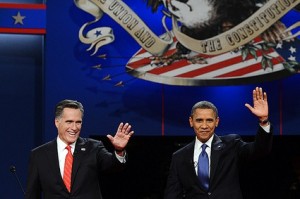(ThyBlackMan.com) Romney scored points early on Wednesday in a presidential debate that pitted him and President Obama in a contest of wits over economic policy. Romney appeared confident as he criticized the president for devoting too much time to garnering Congressional approval of the Affordable Care Act, instead of focusing his attention on rising unemployment numbers. Obama, who appeared sluggish, and whose bodily demeanor wavered at times between that of a flu victim on cold medication and a deer in the headlights, analogized Romney’s healthcare voucher plan to the abandonment of his own grandmother. Both men sought to highlight the differences in their plans to jumpstart a lagging economy to a small coterie of still undecided voters.
Debate moderator Jim Lehrer allowed the candidates to touch upon subjects as varied as Medicare and Social Security, the tax code, and education funding. In each case, despite his noticeable and uncharacteristic lack of poise, President Obama managed to present himself as a more populist candidate than Governor Romney – an advantageous contrast in a stormy  economic climate. Indeed, his most memorable line of the night referred to his difference of opinion with Romney on college loans and affordability,
economic climate. Indeed, his most memorable line of the night referred to his difference of opinion with Romney on college loans and affordability,
“But when he tells a student that, you know, ‘you should borrow money from your parents to go to college,’ you know, that indicates the degree to which, you know, there may not be as much of a focus on the fact that folks like myself, folks like Michelle…just don’t have that option.”
Romney countered that he did not have plans to cut funding for higher education to balance the deficit. But the damage was done. Obama reminded the voting public about the crucial contrast between himself and Mitt Romney, the single most important factor in deciding the outcome of this presidential election – relatability. Beyond gun rights and gay marriage, beyond the most vitriolic ad campaign against Pell grants or welfare, the issue of the candidate’s relatibility, even if only in economic terms, will decide the outcome of the election.
Everyone, even resentful bigots, wants to believe that their elected leaders empathize with their money woes through personal experience. The candidate able to communicate that he authentically understands the anxiety of the truck driver or salesman head-of-household who can’t afford the cost of college for his kids, or the single parent whose home value is now worth less than the mortgage loan, will win the presidency. Bill Clinton captured this winning sentiment in his now famous slogan from his 1992 presidential campaign, “I feel your pain.”
Implicit in this statement is the assertion, I’m like you because I am also from the middle-class, and that will inform my decision-making in the White House. Clinton projected empathy for the middle-class that his billionaire opponent, G.H.W. Bush, by implication could not feel, and rode a wave of popular appeal to victory in November. So again, in the 2012 presidential election, Obama successfully contrasted his middle-class credentials with Romney’s patrician policies in the first debate. If he can maintain this populist momentum, the electorate may ultimately forgive his listless debate performance.
In campaign speeches, President Obama has called the 2012 U.S. presidential election “the clearest choice in a generation”. On Wednesday night, debate moderator Jim Lehrer repeatedly referred to a “clear choice” and “clear difference” between the positions of the two candidates on a variety of issues. The contrast between the Republican and Democratic nominees may be so stark (and important) this year because the details of Romney’s center-right political platform and Obama’s center-left platform are overshadowed by a singular, prevailing fear in the mind of the average American voter: fear of the future. In hard economic times, when ideology gives way to self-interest, voters will look for the candidate who most reflects their own aspirations. Whether that candidate is the son of an African immigrant or the boarding school-educated son of a former governor of Michigan, remains to be seen.
Staff Writer; David Christopher Steele, M.A.
Official website; http://facebook.com/thesecondaryeducationcritic




















Guess we read the transcripts for two completely different debats. After reading this I can say one thing. 1] It is obvious that black folk think Obama never lies 2] You have no understand of either of their policies or similarities. Can say for every three lies Romney told, Obama told one but in a nutshell, Barack Obama and Mitt Romney are more alike than Different